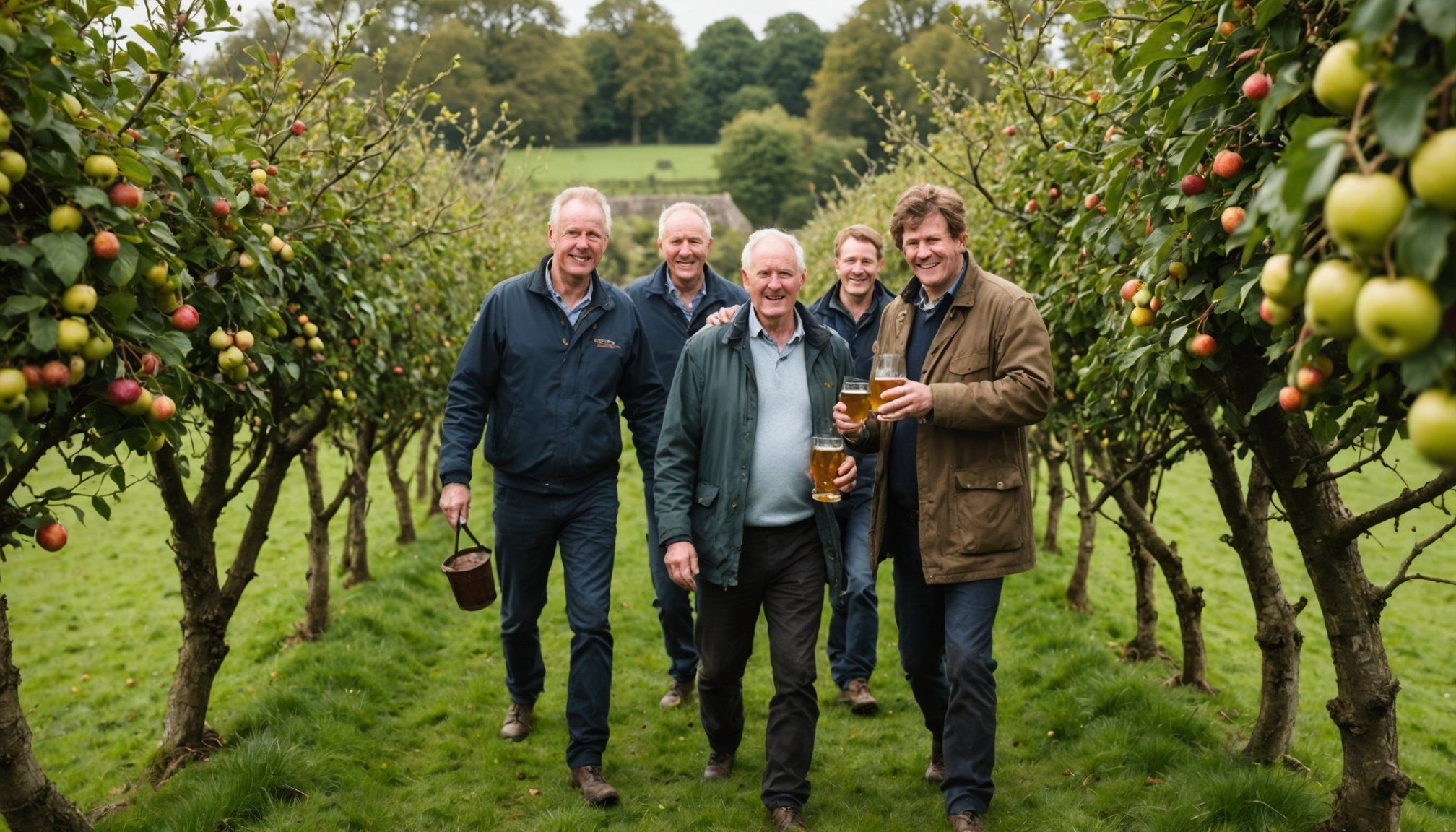Overview of Somerset’s Cider Heritage
In Somerset, cider has become an integral part of British cider culture with a rich history that reflects the county’s agricultural and social traditions. The Somerset cider history is deeply intertwined with the region’s development, given that cider production took root here centuries ago. The area’s fertile land and favourable climate provided the perfect conditions for apple orchards, shaping the local economy and landscape.
Cider is not merely a beverage in Somerset; it is woven into the fabric of local traditions and celebrations. Throughout history, cider has played a pivotal role in community events, ranging from harvest festivals to social gatherings, fostering a sense of unity among residents. Local cider customs also involve unique practices, such as wassailing, intended to protect apple crops and ensure a good harvest.
Additional reading : Unlock the Secrets of Traditional British Leather Tanning: Hands-On Workshops for Enthusiasts
Economically speaking, the cider industry continues to fuel Somerset’s prosperity. It provides employment opportunities on various scales, from family-run cideries to large-scale manufacturers. Consequently, the cider industry’s influence ripples through the local economy, supporting related sectors like tourism and hospitality. Understanding Somerset cider history offers insight into a region cherished for its cultural and economic contributions through cider.
Key Cideries in Somerset
Somerset is home to a stunning array of regional cider producers, each offering a unique taste of the county’s rich heritage. This section explores notable cideries, their distinct styles, and the recognition they’ve garnered.
Also to discover : Dive into the Craft of British Wool Dyeing: An Interactive Tourist Guide to Hands-On Workshops
Notable Cider Producers
In Somerset’s picturesque landscape, cideries such as Rich’s Cider, Wilkins Cider, and Sheppy’s Cider stand out. Each producer boasts a legacy of traditional craftsmanship combined with innovative practices, reflecting the county’s dedication to quality. Rich’s Cider, for example, is acclaimed for its smooth blends, a hallmark of their expertise passed through generations. Wilkins Cider maintains a farm shop ambiance, offering visitors an authentic, rustic tasting experience. Their styles range from sweet to dry, catering to diverse palates. Meanwhile, Sheppy’s Cider, with over 200 years of history, blends heritage with modern techniques, achieving recognition for both traditional and contemporary cider varieties.
Cider Tasting Experiences
Experience Somerset’s cider through tasting sessions that take connoisseurs on a flavourful journey. Each cidery provides insights into their signature profiles, ranging from robust tannic ciders to delicate sweet varieties. They often suggest food pairings that enhance the cider’s depth, offering a holistic tasting adventure.
Visitor Experiences
Visitors can indulge in tours and events that provide deeper insights into Somerset’s cider culture. Many cideries host annual festivals that celebrate the harvest, featuring cider tastings, music, and traditional games. Personal stories from visitors often highlight these experiences as enriching, leaving a lasting impression of Somerset’s vibrant cider community.
The Cider-Making Process
The journey of cider production in Somerset begins with the careful selection of apple varieties. Each type of apple contributes distinctive flavours and aromas, which are essential in crafting a unique cider profile. Ancient trees like Kingston Black and Yarlington Mill are cherished for their rich tannins and complex flavours, critical for creating depth and character in the final product.
The cider-making process continues with traditional techniques that have been refined over the centuries. Fermentation plays a pivotal role, as it transforms the apple juice into cider, with yeast consuming the sugars and producing alcohol. This stage requires attention to detail, as the temperature and time of fermentation significantly influence the overall quality of the cider. Some cideries adopt controlled fermentation processes to maintain a consistent, desirable flavour.
After fermentation, maturation allows the cider to develop its final flavour profile. The length of this stage can vary, often depending on the desired complexity. Innovations in this age-old craft include blending different batches to achieve balanced flavours, resulting in more diverse, contemporary selections alongside traditional offerings. This careful craft is key to the esteemed reputation Somerset cider holds today.
Cultural Significance of Cider in Somerset
Cider in Somerset extends beyond being a mere beverage; it’s a symbol of heritage deeply ingrained in community events and cider customs. One such tradition is wassailing, where the community gathers to sing to the apple trees, believed to ward off evil spirits and secure a bountiful harvest. This ritual highlights cider’s spiritual role in fostering connections and celebrating agricultural cycles.
Local cider festivals are bustling affairs, creating a hub for gatherings that reflect Somerset’s social spirit. These events, like the notable Taunton Cider Festival, attract enthusiasts keen to explore diverse cider offerings while enjoying music and local fare. Such occasions also feature competitions, showcasing innovative expressions of cider-making.
Stories from local cider makers add personal insights into the fabric of Somerset’s cider culture. Many share anecdotes of recipes passed down through generations, blending traditional practices with modern techniques. This interplay ensures that while cider-making evolves, it remains firmly rooted in the past. These shared experiences help preserve cultural identities, emphasising cider’s essential role in regional traditions and celebrations.
Future of Cider in Somerset
The cider industry in Somerset is on the brink of transformative changes, driven by trends like sustainability and innovation. As environmental concerns grow, cider producers are keen to adopt eco-friendly practices, ensuring long-term viability. Some cideries are already shifting towards organic farming, reducing pesticide use while enhancing soil health, leading to more natural and robust apple crops.
Emerging cider industry trends see a rise in experimentation, with anecdotal evidence suggesting a shift towards crafting unique blends. These experiments include infusing cider with unexpected flavours, broadening its appeal to a diverse consumer base keen on adventurous options.
Technological advancements also spur trends, where innovative fermentation techniques promise to refine flavour profiles further. Some cideries now employ precision fermentation processes, allowing for greater control over cider production parameters.
In summarising the potential changes, Somerset’s cider culture may evolve into a model of sustainable, creative production. By embracing these trends and integrating new methods with age-old traditions, Somerset can continue to champion its cider culture, keeping it relevant in a swiftly changing world. The willingness to innovate while preserving historical methods emphasises the adaptability and enduring charm of Somerset’s cider industry.
Travel Tips for Cider Enthusiasts
Embarking on a cider-focused journey through Somerset is a delight for enthusiasts eager to explore this rich cultural landscape. Understanding the best times to visit can enhance your experience. The peak cider harvest occurs in autumn, a time when vibrant orchards and bustling festivals bring Somerset’s cider culture to life. However, consider the mild summer months too, perfect for leisurely cider tours amidst pleasant weather.
Recommended Cider Tours and Routes
A self-guided tour offers flexibility and the chance to discover charming villages and notable landmarks along the way. Popular routes include stops at renowned Somerset cideries, providing immersive tastings and insights. Tools like regional maps or dedicated cider trail guides can help in crafting your itinerary, ensuring you don’t miss top producers.
Practical Tips for Visiting Cideries
When planning your visit, remember to check cider event calendars to coincide with local festivals. Travellers should wear comfortable attire, and appropriate footwear for touring orchards or cider houses. It’s also courteous to engage with hosts, and abide by any guidelines presented, enriching your visit with personal connections and authentic local stories.








